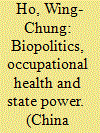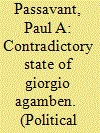| Srl | Item |
| 1 |
ID:
141100


|
|
|
|
|
| Summary/Abstract |
This article endeavours to address the experience of Chinese workers with occupational disease as an instantiation of Agamben's notion of homo sacer – the ultimate biopolitical subject whose life is located outside the “normal” political, economic and cultural practices and, hence, is rendered largely silent and unintelligible in the public realm. It argues that the victimization of the occupationally sick worker has become almost a blind spot at the centre of governmentality insofar as the specific set of social regulations and power relations has created a “double ambivalence” among the victims who are constantly and disturbingly caught in between the public and private, the productive and unproductive, and the culturally normative and the culturally deviant. Such experiences of marginality contribute to the understanding of the biopolitical nature of contemporary Chinese state power, which adopts extensive “stability maintenance” (weiwen) measures to reduce resisters to a state of “bare life” susceptible to the rule of exception.
|
|
|
|
|
|
|
|
|
|
|
|
|
|
|
|
| 2 |
ID:
077228


|
|
|
|
|
| Publication |
2007.
|
| Summary/Abstract |
I argue that Giorgio Agamben employs two, contradictory theories of the state in his works. Earlier works, such as The Coming Community and Means without End, suggest that the state today functions as an aspect of the society of the spectacle where spectacle is the logical extension of the commodity form under late capitalism. This part of Agamben's work attributes a determined character to the state and a determining power to the economic forces of capitalism that conditions particular forms of the state. Later work, such as Homo Sacer: Sovereign Power and Bare Life and State of Exception, are preoccupied with the logic of juridical sovereignty and the increased frequency of states of emergency. This part of Agamben's work attributes a determining strength to the state under current conditions. Although his earlier work provides a more coherent narrative of how it is possible to move from contemporary society to ideal community, it does not provide the theory of political action necessary to overcome the power of the state he describes when he theorizes the state in Homo Sacer and State of Exception. None of the three possibilities of political action present in his later works provides passage beyond state sovereignty without violating his philosophical commitments.
|
|
|
|
|
|
|
|
|
|
|
|
|
|
|
|
| 3 |
ID:
178387


|
|
|
|
|
| Summary/Abstract |
The concept of homo sacer originates from ancient Roman law under which an individual who committed a certain kind of crime was excluded from society and all his/her rights as a citizen were revoked. This paper uses a few selected cases reported in the media of Botswana and South Africa to demonstrate why undocumented migrants in the two countries fit Agamben’s description of homo sacer. While migrants in general, whether documented or undocumented, are targets of violence, exploitation and discrimination in these countries, undocumented migrants are particularly vulnerable because of their ‘illegal’ status. Although violence against undocumented migrants is not formally endorsed by the state, their description as a problem or a threat to society places them in a state of exception which is virtually outside the protection of the law.
|
|
|
|
|
|
|
|
|
|
|
|
|
|
|
|